February 21, 2020 Leave a Comment
Premature infants are born with a low birth weight and have trouble feeding. Here are some tips on helping your premature baby gain weight and grow strong.
Parents of a premature baby have a lot to deal with. From the time the baby is born, to caring for her, bringing her home and following up on milestones, there are many challenges along every step of the way. One of the main parts of keeping a premature baby is is ensuring that the baby gains weight steadily.
Who is a Premature Baby?


Since normal human gestation is considered 39 weeks, a baby born anywhere before 37 weeks is considered a premature baby or a preemie. However, how premature the baby is depends on how early the baby was born:
- Late preterm – born between 34 and 36 weeks of pregnancy
- Moderately preterm – born between 32 and 34 weeks of pregnancy
- Very preterm – born at less than 32 weeks of pregnancy
- Extremely preterm – born at or before 25 weeks of pregnancy
The baby’s weight will also depend upon how premature she is. Full term babies weigh approximately 3 kg at birth, and the earlier the baby is born, the less she will weigh. Most premature babies weigh less than 2.3 kg at birth.
The reason the baby’s birth weight is significant is because it is an indication of their chance of survival. 90% of babies weighing at least 800 grams have a higher chance of survival. This drops to 60% when the babies weigh only 500 grams.
Low birth weight is a more serious issue for a preemie than a full term baby. All babies lose weight after birth as they lose a good amount of fluid. They then catch up to their birth weight in about two weeks. For a premature baby who is already seriously underweight, further weight loss can be dangerous, especially since their rate of gaining weight is also slower than full term babies, just about 5 grams a day. There are many reasons for this, including challenges in feeding a premature infant.
Challenges in Feeding Preemies


1. Babies born before 32 weeks are unable to feed properly since they have not yet developed the sucking and swallowing reflex. They can’t coordinate breathing, sucking and swallowing in the right order.
2. Premature babies tend to lose more water through the skin or respiratory tract. Their kidneys are underdeveloped, due to which they find it harder to maintain a fluid balance compared to full term babies. As a result, they could be dehydrated or over-hydrated.
3. Several premature babies suffer from respiratory issues and circulation problems which also come in the way of eating properly and gaining weight.
4. Premature babies may not be able to process the proteins in breast milk
Due to these reasons, preemies cannot be expected to feed from the breast or bottle like full term babies do. For them, most hospitals have special facilities in their Neonatal Intensive Care Unit or NICU.
Hospital Feeding for Premature Babies


At the hospital, premature babies are placed in the NICU and observed carefully to make sure they are getting stronger. This is done mainly through two ways – ensuring they don’t lose weight, and providing the nourishment to help them gain weight.
To prevent further weight loss, newborn preemies are placed in incubators which keep babies warm and help them maintain their body temperature. This way they don’t have to expend energy trying to stay warm. The incubators also have moist air that prevents water loss.
To help premature babies gain weight, they are fed through special methods:
1. Intravenous Feeding – In this case, fluids are sent through an IV line that is connected to the baby’s arm, leg or head. This helps babies whose lungs are underdeveloped and whose body is not ready to process milk.
2. Gavage Feeding – This is for babies who can’t suck due to a heart or lung problem or because their reflexes aren’t strong enough. Here, the milk is sent to the stomach through a tube placed in the mouth or the nose.
3. Umbilical Catheter – While not commonly used, this method involves placing a tube into the baby’s umbilical cord and feeding through it.
Whatever method of feeding is used, it is important to increase the quantity very gradually to prevent an intestinal infection called necrotizing enterocolitis (NEC).
Weight Gain in Premature Babies


Since it is crucial that the preemie get stronger quickly and catch up with her full term peers, the baby is monitored every day at the hospital. The nurses weigh the baby every day and check if there is enough urine output. They may also do blood tests to check electrolyte levels.
Most babies lose a little weight initially and quickly pick up after that. Smaller babies gain weight slowly, at just 5 grams a day, while bigger or late preterm babies may gain up to 30 grams a day. The growth rate should be similar to the rate the fetus grows during the final trimester.
Premature baby weight is usually tracked using the Fenton growth charts. There are separate charts for baby girls and baby boys, based on how preterm the baby is.
Once the baby is stronger and can tolerate milk, she is fed breast milk or formula and encouraged to suck. Most hospitals let the baby out the incubator once they are at least 2 kg. When the baby is out of the incubator and is gaining weight steadily, she is ready to come home. Now it is up to the parents to ensure the baby continues to gain weight, and here are a few tips to help.
Helping your Premature Baby Gain Weight


1. Opt for Breast Milk


Breast is best for all babies, and particularly so for preemies. It has lots of calories and nutrients, as well as antibodies to keep the baby safe from infection. It is also found that breast fed preemies are less likely to succumb to SIDS or NEC. Colostrum, the first milk produced by the breast is especially beneficial for premature babies.
For preemies who are feeding directly, the breast is easier than the bottle since the baby can control the flow of the milk. Uncontrolled flow from a bottle can cause the baby to choke. Besides, active sucking on the breast stimulates the milk glands to produce more milk and keep up with the baby’s demand.
Since a premature baby is born ahead of time, the mother’s body may not be ready to produce milk in some cases. In such situations, hospitals may have facilities to get milk from a milk bank. When the milk does come in, the mother can express it either manually or using a breast pump, and it can be fed to the baby through a tube. Even if the baby can’t tolerate milk right now, the mother is still encouraged to pump to stimulate the milk glands so there will be enough milk when the baby is ready for it.
2. Try Supplementary Formula


When babies are able to develop for the full term of pregnancy, they are able to complete their development properly and get all the nutrients they need. However premature babies miss out on this important stage and as a result they are usually lacking in some nutrients.
Due to this, doctors often recommend a supplemental formula that has been specially designed for preemies, with important vitamins and minerals that’ll help them reach the nutritional levels of their peers and also ensure steady weight gain. They may need this in addition to breast milk. Even after babies switch to complete breastfeeding, they may still need supplements for iron and Vitamin D.
3. Feed according to a Schedule
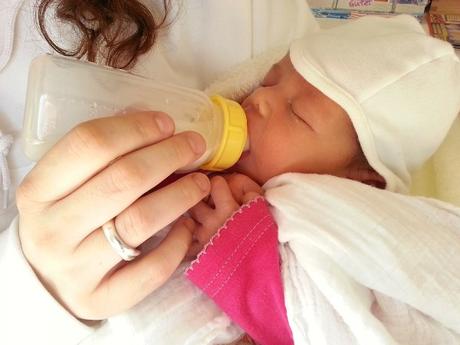
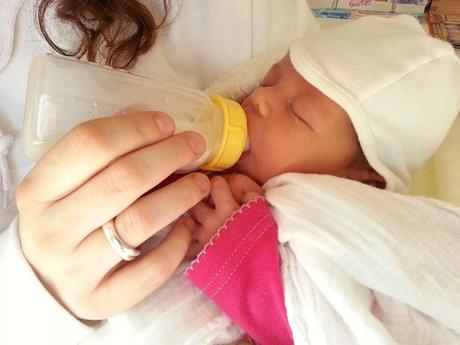
New mothers are often advised to feed the baby on demand, but in the case of premature babies, it is recommended to feed according to a schedule. Most babies need to be fed every two or three hours like clockwork, even waking the baby from sleep to stick to the schedule.
Premature babies may not give out strong signals that they’re hungry, which is one reason to stick to a feeding schedule. Some babies may get uneasy when hungry and move around a bit. A good idea to know if baby is getting enough milk is by checking if she has about 6-8 wet diapers a day.
4. Practice Non Nutritive Sucking


Breastfeeding can be hard for full term babies, but for preemies it can be particularly difficult. Babies with respiratory issues have trouble sucking from the breast. One way to encourage them is to practice non-nutritive sucking, that is having them suck on something just to practice the movement.
One way is to let the baby suck on the empty breast. Another way is to attaching a tube called a nursing supplementer to the breast and letting the baby suckle on both at once. Pacifiers may also help by encouraging the baby to suck harder.
5. Maintain Skin to Skin Contact
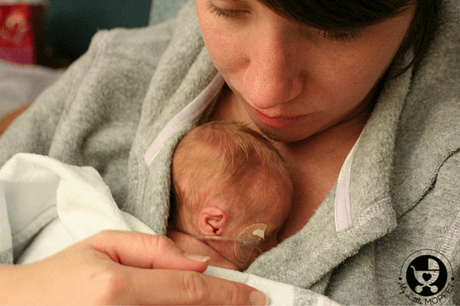
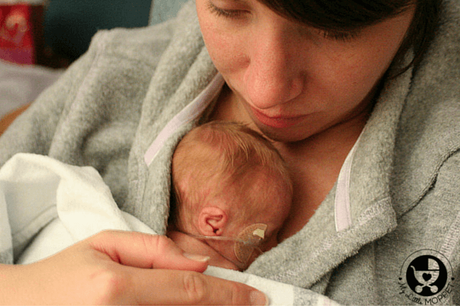
Skin to skin contact is a very effective way to help premature babies get stronger and maintain a good weight gain. For one, it keeps them warm so they don’t have to spend energy trying to regulate their body temperature. It also keeps them comfortable and secure, all factors needed for healthy growth.
It is easy to practice skin to skin contact with a preemie. Kangaroo care is one option and baby wearing works for stronger babies. Co-sleeping is also recommended, and it increases the success of breastfeeding. Staying close to the mother or father stabilizes the baby’s heart rate and improves sleep.
5. Massage the Baby


Massaging babies is something we’ve been doing traditionally, and it has a lot of benefits, including ensuring good growth and weight gain. Premature babies can also benefit from light massage using gentle strokes. It’ll also comfort them and help them sleep better.
When using a massage oil for a preemie, get the doctor’s go-ahead first, since preemies are so sensitive. Try to get it done only by parents or grandparents, rather than hiring an outsider. The baby can be massaged up to twice a day, depending upon the doctor’s opinion.
6. Keep Infections at Bay
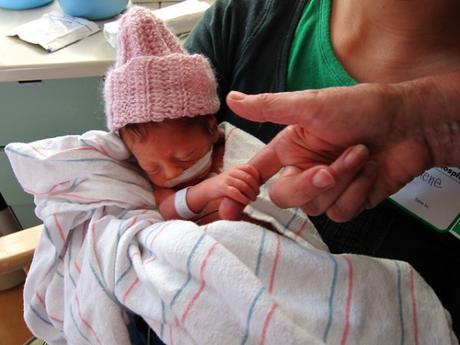
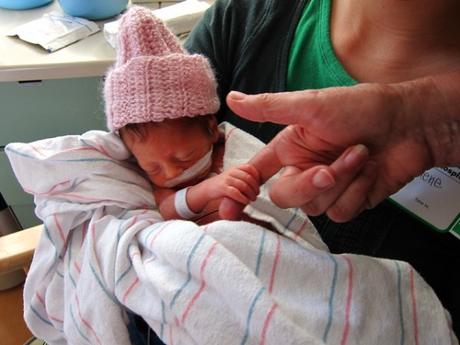
Premature infants have underdeveloped immune systems, which is why so much care is needed when handling them. Any infection can lead to weight loss, which can prove dangerous for babies who are early preterm or low weight at birth. Make sure all bottles, nipples, spoons etc that the baby uses as well as all breast pump parts are washed and sterilized.
Try to find an alternate home for pets at least till baby is stronger. Avoid guests and crowds and ask siblings and other family members to come close to the baby only after they’ve washed their hands and changed their clothes when coming in from outside.
7. Get Regular Checkups


When the baby is in the NICU, the nurses are monitoring him all the time, and this has to continue even after baby is sent home. When getting discharged, the doctor will inform the parents about the baby’s follow up appointments. Get the baby checked at every prescribed appointment and follow the doctor’s instructions to the letter.
The doctor will evaluate the baby and see if he is growing satisfactorily. Feel free to ask the doctor about any doubts about the baby’s development. Remember that a preemie should not be compared with a full term baby of the same age. With lots of love, patience and care, your preemie will grow to be a strong, healthy and happy child with a normal life.


Organic · FSSAI Certified · NABL Lab certified Buy Sprouted Sathumaavu Health Mix powder for Babies / Homemade Cerelac Dry Fruits Powder for Babies/Toddlers Pancake Mixes for Toddlers TweetPinShareWhatsAppEmail
Filed Under: Baby, Baby health, Growth and Weight, Nutrition, Parenting Tagged With: baby weight, caring for a preemie, caring for a premature baby, how to care for a preemie, how to care for a premature baby, preemie, premature baby, weight gaining, weight loss
